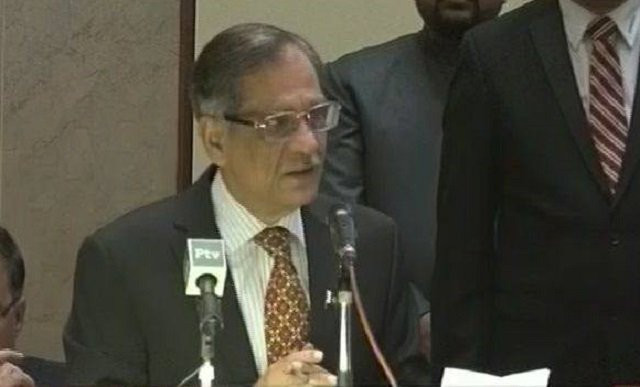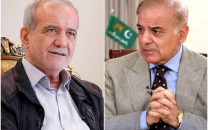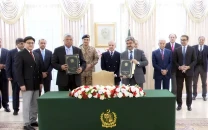Judiciary is paralysed due to govt, says CJP
Top judge reiterates resolve not to let democracy derail

The Chief Justice of Pakistan Saqib Nisar
PHOTO: FILE
“The government says that judiciary has paralysed it. The government has no idea how paralysed we have been due to the government,” Justice Nisar said while addressing a meeting of the National Judicial Policymaking Committee on Saturday.
Addressing the lawyers’ fraternity in Karachi a day earlier, Nawaz Sharif, who was disqualified by the apex court for hiding his assets on July 28, 2017, had said the day-to-day affairs in Pakistan had now been paralysed and the judiciary had ‘insulted’ the Prime Minister’s Office.
CJP vows not to let democracy derail
Sharif had launched his latest attack against judiciary in the back drop of contempt proceedings against a number of the Pakistan Muslim League-Nawaz (PML-N) leaders.
The apex court has issued contempt of court notices to Privatisation Minister Daniyal Aziz and Interior Minister of State Talal Chaudhry for making contemptuous speeches against superior judiciary. It has already jailed Senator Nehal Hashmi on similar charges for a month and disqualified him for five years.
Sharif on Friday also claimed that ‘factions’ in the judiciary and army ‘weaken democracy every time it starts to strengthen’.
Rejecting the claims, the CJP said: “Forget that any conspiracy is taking place; that the judiciary is a partner in the crime. This judiciary is independent and no one can dare influence it.”
“God willing, I will never let democracy derail. This is my promise to you. I will quit and not be here if that happens. I promise,” he said. However, he added that he would also ensure respect and dignity of the judiciary.
CJP takes suo motu notice of Talal Chaudhry's 'contemptuous speeches'
Justice Nisar said an impression was being created that ‘certain quarters are trying to pressurise the superior judiciary to get things go their way’.
“No one has the courage to influence any of my judges. Each and every judge of mine is independent and takes decisions with full authority and responsibility, whatever he deems suitable. There is no external pressure or any kind of ‘in-house’ pressure,” he said.
He said the ‘Doctrine of Necessity’ had been buried forever. “We have buried the Doctrine of Necessity in the Sindh High Court Bar Association case and there cannot be a better judgment in the history of Pakistan,” he claimed.
The top judge put his weight behind parliament, saying the Constitution holds the legislature as the supreme institution tasked with lawmaking. However, the CJP reiterated zero tolerance for anyone violating the Constitution.
Judgments aren't written to settle scores: CJP
Addressing the judges, he said God has assigned them the noblest responsibility to dispense justice. “The goal of a judge should not be to dispose of cases merely to meet the desired target (i.e. to reduce pendency of cases). His/her mission should be to disseminate speedy justice while listening to his/her conscience and adhering to Islamic principles of justice for all regardless of their social statuses.”
The CJP said justice should aim at satisfying the public grievances to help create a just society where supremacy of the rule of law is exercised in letter and spirit.
“We are the highest-paid government officials. Are we doing justice to the handsome salaries we have been receiving? We need to ask ourselves… we need to do self-reflection. We have to hold ourselves accountable. Yes, some mistakes were made in the past and we have to move on but we have also to make sure that such mistakes are not repeated,” he added.
He said if great leaders and great judges became part of this country, no one could stop this nation from progress and prosperity. “We have to bring the ‘big crocodiles’ in the court of law,” he added.
CJP proposes elevation of LHC chief justice as SC judge
The chief justice defended the practice of suo moto notices, saying the same aimed at protecting the basic rights of the citizens and to make sure that no one faced injustice.
“The protection of the rights of the public is the core aim of the judiciary. As long as I am in office, I would make sure that not even an iota of negligence is shown in this regard,” he said.
No stay on CPEC-related projects
Meanwhile, the CJP directed the chief justices of high courts to “advise civil courts that no ex-party stay orders are passed in respect of CPEC [China-Pakistan Economic Corridor] related projects” while chairing a special meeting of the National Judicial (Policy Making) Committee (NJPMC) on Saturday.
The CJP chaired the meeting in his capacity as the NJPMC chairman for consideration of Dispute Resolution Mechanism for the CPEC Projects. The meeting was attended by the members of the NJPMC, including judges of the Supreme Court, chief justices of high courts and the Federal Shariat Court.
According to a press release, the CJP informed the meeting that during his visit to China in 2017, the chief justice of the Supreme Court of China showed his concern over dispute resolution mechanisms to deal with likely disputes arising out of CPEC projects and “desired that some expeditious dispute resolution mechanism may be framed.”
The CJP told the NJPMC meeting that dispute resolution under the general law in Pakistan often took long time and the procedural and substantive laws required upgrading to this effect.
After hearing the viewpoint of senior judges and some top bureaucrats who attended the meeting on special invitation, Justice Nisar directed the chief justices to advise civil courts that no ex-party stay orders are passed in respect of CPEC related projects. The meeting of NJPMC was held after a gap of more than two years while it is required to be held four times a year.



















COMMENTS
Comments are moderated and generally will be posted if they are on-topic and not abusive.
For more information, please see our Comments FAQ